GitHub 101
Before we begin
Organizational stuff
Who am I?
Jakub Gutkowski
Enjoying Life
@gutek
https://blog.gutek.pl
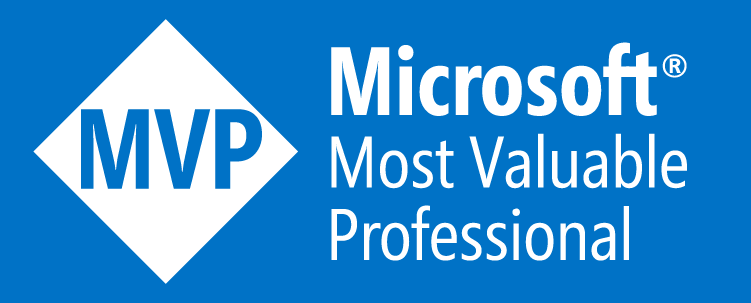

Contract
- Ask about anything!
- Make notes!
- Do your exercises, and we can guarantee you will gain an understanding of how things work
- There will be breaks during a day, but feel free to do a break when you need it
Goal of the workshop
Familiarize yourself with GitHub, GitHub features and GitHub flow
Workshop targets
- Developers/DevOps
- People not familiar with GitHub
To do exercises you will need
- Editor (notepad, vim, vscode, etc)
- git, installed locally (no previous knowledge required)
- GitHub account
Follow us
link in chat
Git and GitHub
Agenda
- Learn about what is Git
- What are the building blogs of Git
- Learn about what is GitHub
- How GitHub relates to Git
- Why use GitHub
- GitHub
- UI
- Profile
- SSH
Git
What is Git?
Created in 2005 by Linus Torvalds
For developing of Linux kernel
Distributed Version Control System
(open sourced) with collaborative and remote work in the heart
Centralized vs Distributed
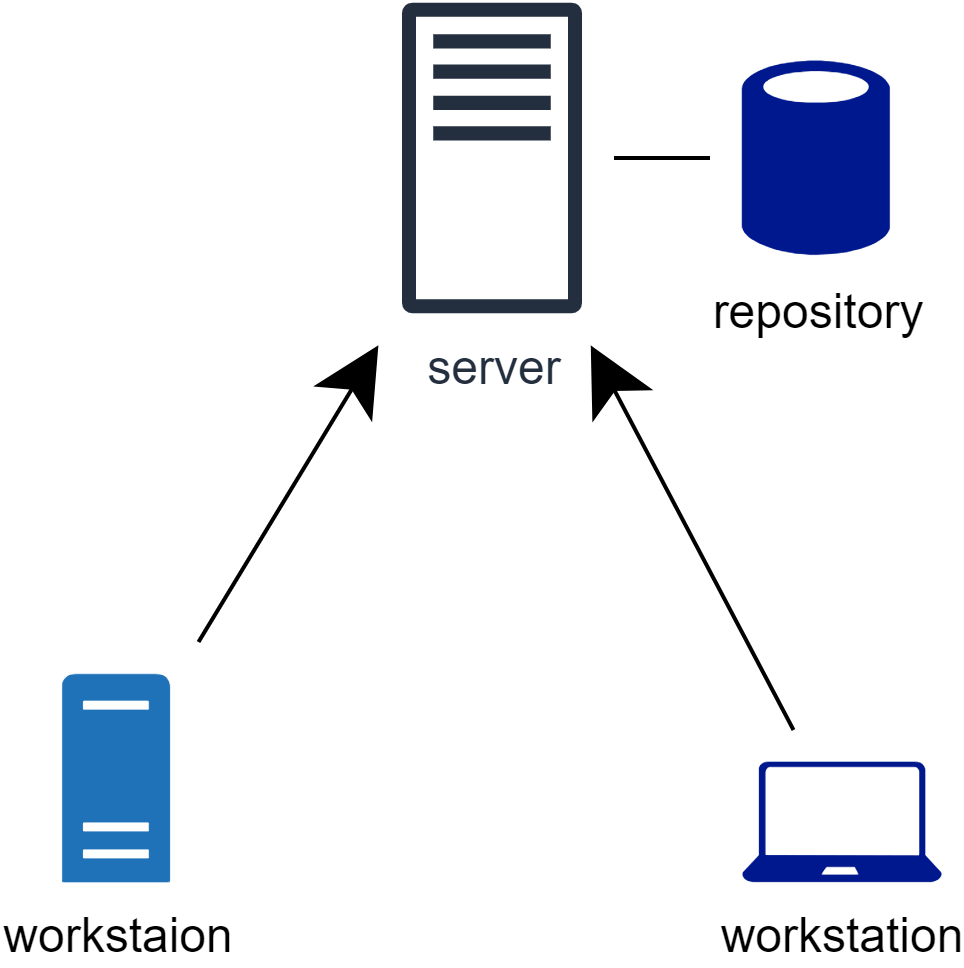
Centralized vs Distributed
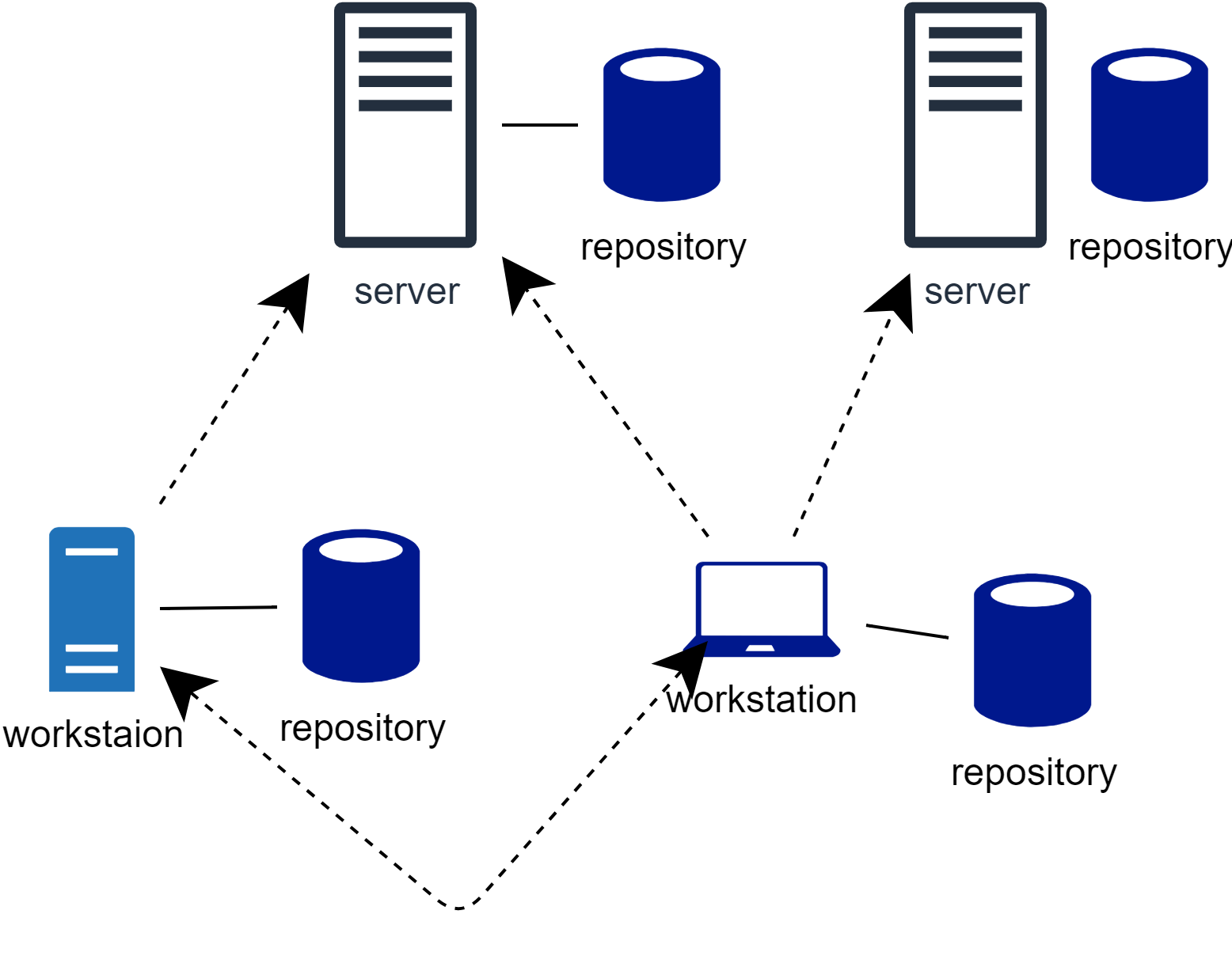
Centralized vs Distributed
Centralized
- Good for large binary files
- Security based on the folder structure
- Smaller disk footprint
- Hard to work offline
Distributed
- Work fully offline
- Local actions are extremely fast
- Might have a larger disk footprint (you're downloading the whole repository with all branches)
- Many "backups"
Integrity
SHA-1
- Everything is checksummed
- Everything is then referenced by that checksum
- Everything is stored in git database is named by hash of its content
49e68ee44ba1c8bc093c5523635ddba5c4e6a55e
Shanpshots
most VCS
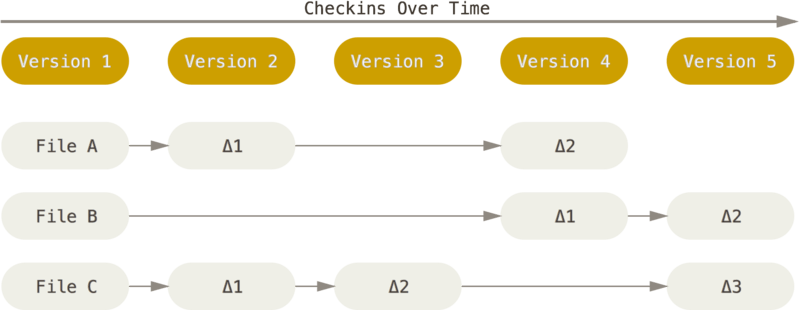
Shanpshots
git
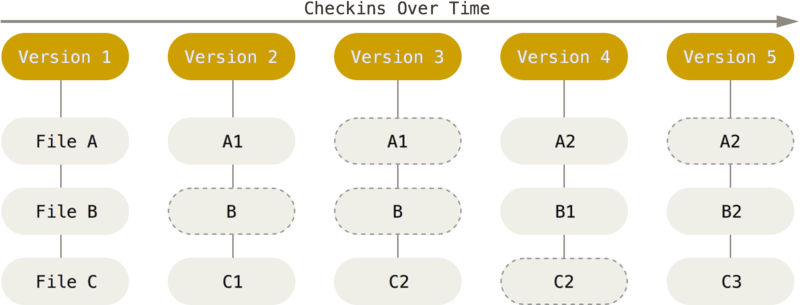
Snapshots
Most VCS
- Store file as one version
- All changes to that file are store as delta/changes
Git
- Store file as one version
- Each commit is a picture of that current state
- All changes to that file are stored as:
- a new version
- or pointer to the previous state
Three States
- modified - changed, not yet committed
- staged - ready to be committed
- committed - its stored in local database/repository

Three Areas
- Working directory (modified state)
- Staging Area (staged state)
- .git directory, repository (committed)
How popular is Git?

How popular is Git?

Are there disadvantages of using git?
- Storing large binary files
- No built-in access control
- Learning curve if you have not been using similar VSC before
- Getting repository can take longer
How to use git?
- Install
- Configure
- Work with repositories
Installation

Configuration
git config --global user.name "John Doe"
git config --global user.email john@doe.com
# set default branch name to main
git config --global init.defaultBranch main
# optionally, change default editor:
git config --global core.editor "code --wait"
git config --global core.editor "nano"
git config --global core.editor "vim"work with repositories
# create reposiotry
git init
# list folders
ls -la
# create file and add it
echo "THIS IS TEST" > README.md
git add README.md
# commit changes to current branch
git commit -m "add readme file"demo: three states
git init
ls -la
echo "THIS IS TEST" > README.md
git status
git add README.md
git status
git commit -m "add readme file"
git status
echo "NEW CONTENT" > README.md
git status
git add .
git status
git commit -m "replacing file"thats all?
- no, there are many other commands
- few we will be using soon
- most we will not be used at all during a workshop
- for a full list of commands see here
- to learn more, read free book Pro Git
GitHub
What is GitHub?
A collaboration platform that uses git as a source for managing assets.
It happens to be mainly used by developers to create and collaborate on software projects, but it does not need to be.
What you can use GitHub for?
- Explore projects, designs, documentation, books etc
- Discussions/forum
- Collaboration over the house/flat design, book or code
- Learning by reading others code/design, books
- As an online file editor
- Hosting static pages, blog or JavaScript game, etc
- And many many more
What's the difference between Git and GitHub?
None, two different products. It just happens that underneath nice UI and feature reach platform of GitHub, as a foundation, lays git, distributed version control system fuse some of the most advanced features of GitHub
Who is the target group of GitHub?
Developers/DevOps (the one that wants to be, junior, senior, past developers, etc) and then Organisations (with many developers ;))
basically anyone who wants to work with code
What they are gaining by using GitHub instead of pure git?
- The management part of collaboration:
- issues
- pull requests
- project boards
- The social part of a collaboration
- discussions
- comments
- reviews
- The automation part
- building
- publishing
- validating
Are there competitors to GitHub?
Yes
- GitLab
- Bitbucket
- Azure DevOps
- And few smaller with smaller set of features
Why GitHub?
Currently is used by 65+ million developers with an aim to reach 100 million in 2025
It hosts more than 200 million repositories and is used by over 3 million organisations including 72% of Fortune 50
Why GitHub?
Who is using GitHub?
Since 2018, GitHub is part of Microsoft
All Microsoft open source projects are hosted on GitHub
More than 2000 Google employees contribute to projects on Github
More than 2000 RedHat employees contribute to projects on GitHub
More than 1000 employees of IBM and Intel contributes to projects on GitHub
Almost every big company contributes or hosts projects on GitHub
So why don't you? :)
GitHub Main Features
Code
Issues
Pull Requests
Automation
Discussions
All of this for free?

All of this for free?


demo: GitHub
- Open https://github.com
- Home Screen
- Profile Screen
- Repository screen (with menu)
- Profile Settings
- Viewing another repository (EventFlow)
- Traversing repository
- Pressing .
- Searching, advance searching
Everything in GitHub is around
REPOSITORIES
Accessing GitHub
- Everyone can access the public repository
- Only GitHub users can contribute to public repositories
- Only GitHub users that have access rights can access and contribute to private repositories
demo: downloading repository
# open https://github.com/microsoft/muzic
# Code >
# - Open with GitHub Desktop
# - Open with Visual Studio
# - Download ZIP
# - Clone - https/ssh
git clone https://github.com/microsoft/muzic.git
git clone git@github.com:microsoft/muzic.gitexercise: create GitHub account
Only do it if you do not have an account!
- Open https://github.com/signup
- Follow wizard
- Login to GitHub
demo: configuring profile
- Open https://github.com/settings
- Configure Public profile
- Account settings
- Appearance
- Account security
- Security log
- Notifications
- Blocked users/Interaction limits
demo: setting up ssh
ssh-keygen -t ed25519 -C "github.email@address.com"
# ssh-keygen -t rsa -b 4096 -C "github.email@address.com"
# start ssh agent
eval "$(ssh-agent -s)"
# add key to ssh agent
ssh-add ~/.ssh/id_ed25519
cat ~/.ssh/id_ed25519.pub
# copy and paste it to GitHub
# test if you can log in
ssh -T git@github.comSummary
- We know what git is and how it works
- We know what GitHub is and how UI looks
- We can customize our profile
- We can secure our profile
- We can create and use SSH key to work with GitHub
GitHub
Repositories
Agenda
- Creating Repository on GitHub
- Working with Repository on GitHub
- Administration
- Special Files
- Insights
Everything in GitHub is around
REPOSITORIES
demo: creating non empty repository
- Open https://github.com/new
- Provide name and description
- Select visibility (Public)
- Initialize with README, .gitignore and license MIT
- Update description
- Add Topics
- Add Files
- Do it with .
demo: creating empty repository
- Open https://github.com/new
- Provide name and description
- Select visibility (Public)
echo "# empty" >> README.md
git init
git add README.md
git commit -m "first commit"
# move branch/rename
git branch -M main
git remote add origin https://github.com/Gutek/NAME.git
git push -u origin main
# or
git remote add origin https://github.com/Gutek/NAME.git
git branch -M main
git push -u origin maindemo: configuring repository
- Open repository settings page
- Describe configuration pages
demo: templating repository
- Open repository settings page
- Enabling templating
- Create a new repository from template
- Check what was copied and what wasn't
demo: deleting repositories
- Open repository settings page
- Delete repository
exercise: working with repositories
- Create repository template
- Add description, license file, readme file
- Add topics including template topic
- Add file: your name, and with content your surname
- Edit readme file
- Remove features not used: Wiki, Issues, Project, Preserver this repository
- Set it as a template
- Create repository from template
- Remove new repository but leave template repository
result: working with repositories
- The template only copies files
- It does not transfer repository settings
Special files
- Files that GitHub Understands
- Files that cause GitHub to do something special
demo: CODEOWNERS
- Create file CODEOWNERS
- Show CODEOWNERS in action

demo: README.md
- Shows readme.md
- Works in each folder
- It's displayed on repository home page


demo: LICENSE
- Describes what we can do with the source code
- Shows human-readable description

demo: CONTRIBUTING.md
- Describes how others can contribute to this repository

demo: CODE_OF_CONDUCT.md
- Describes principles that contributors and others should follow when working with a repository

exercise: citation file
- Add new file: CITATION.cff
- Observe what is happening
- Use example
- Where do you find the results of that file?
result: citation file
- After providing name: CITATION.cff git hub will provide hint
- Same thing happens to most special files including templates

demo: CITATION.cff
- Describes how to cite the repository

demo: SECURITY.md
- Describes what versions are supported and how to report a vulnerability


There few more files
- Issue templates
- Pull request templates
exercise: add special files
- In the template repository add special files
- Include:
- Citation
- Code owners
- Code of conduct
- Contributing
- License (if not present)
- Readme (if no present)
exercise: move files to .github
- create .github folder
- Move files to that folder
- Citation
- Code owners
- Contributing
- What options are working, what are not?
demo: Insights
- Open repository Insights
- Describe sections
demo: Security
- Open repository Security sections
- Describe sections
exercise: security
- In template repository
- Add Security Policy
- Create and Publish Security Advisory
- Close/Remove Security Advisory
result: security
- You can't delete/remove Advisory
- Only GitHub can do it
- Be careful when you play with this on your official repository
demo: wiki
- Open template repository
- Open Wiki section
- Create Wiki with two docs
- Show where the wiki is stored
Wiki
- Used to be used a lot
- Some old projects still have documentation on Wiki
- New projects are mainly not using this
- Consider this a legacy feature
Forks
- Creates a copy of the repository
- In that copy, we can do whatever we want
- It's our repository, not someone else repository
- This is how we can collaborate with public and private repositories
demo: Fork
- Create a fork of a template repository
- Add file
- Create Pull Request (we will be discussing them soon)
Summary
- We created a repository with and without files
- We've configured the repository
- We've created special files
- We've created Wiki pages
- We've been working with Forks
- We also understand what Insights and Security sections of repository are
GitHub
Issues
Agenda
- What are Issues
- What are Projects
- What are Labels
- What are Milestones
- How to work with projects and issues
- How to create Issue Templates
What are Issues?
- Work item, tasks, question, bug, user story
- Way to discuss around a particular item
- Way to classify an item (owner, project, milestone, etc)


What are Projects?
- A way to managing work around issues
- It's basically a board like Trello, Kanban etc.

What are Projects?
- Boards can be managed manually or automatically
- It helps see what's the current status
- Projects are not needed to work with Issues
- One issue can be assigned to many projects
- Can be used to filter issues

What are Labels?
- A way to classify Issue
- Tags
- Can be used to filter issues

What are Milestones?
- A way to group Issue
- Can be used to filter issues


demo: working with issues
- Create Project with Automation
- Create Label and Milestone
- Create Issue, assign project and label and milestone
- Pin issue
- Create new issue and reference created previously issue in the description
- Create a new issue and reference issue in a comment
- Close Issue
- Show repo with many issues
demo: issues template
- Create a new issue template by opening Insights / Community
- Create issue using that template
excersie: Issues
- Create a project with an automatic kanban board
- Create Milestone and Label for user stories
- Create Issue template for User Story with auto labelling and assignment
- Create two issues of type User Story
- Assign them to Milestone and Project
- Check Project board
- Move one Use Story to Done, other to In Progress
- Check the status of the User Story that is in Done
- Open User Story in In Progress and close issue
- Check board again
result: Issues
- Automation of issues works only when we execute them on Issue, not on board
- Moving items on the board only influences the activity feed of the issue, it does not change it status
Issues Template
- We can do more:
- we can customize forms and fields
- we can customize validation
- we can customize what options are available for creating new issue
demo: issue form template
- Open https://github.com/Gutek/gutek-template
- Show ISSUE_TEMPLATE folder
- upload bug_template.yml or use template
- Create Bug Report
Summary
- We know what issues and projects are
- We know how to use them
- We know how to work with labels and milestones
- We know how to create an issue templates
GitHub
Discussions
Agenda
- What are discussions?
- How to enable discussions?
What are Discussions?
It's a collaborative space where the community can discuss around project and or initiative
It fills the gap that Issues had created - where to discuss proposition, ask questions, share ideas
Issues have different contexts and meanings, mixing it adds cognitive load to daily work
demo: how discussions are used
- Project community like EventFlow, dotnet runtime etc.
- Forum like Azure Community PL
demo: enabling discussions
- Create and setup discussions in the repository
- Create issue from discussion
- Revert issue into discussion
Summary
- We know what Discussion are
- We know how others use Discussions
- We know how to enable the Discussion feature
- We know how to convert an issue into discussion
- We know how to convert discussion into issue
GitHub
Releases
Agenda
- What are releases?
- What are tags?
- Why do we talk about tags when we talk about releases?
Tags
Releases
What are releases?
- The release is a snapshot of code and information around a specific version of the code
- When we create a new version of the product, we create a new release that includes built assemblies, executables, release notes and all other assets needed to run or deploy our release
- New releases in GitHub comes with a zipped version of the repository of the given time (from which we create release)
What are tags?
- Tag is a git concept
- It allows bookmarking specific points of time during development
- Each tag is assigned to a specific commit on a specific branch
- We can easily switch between bookmarks
- We can use bookmarks to make important stages/states of our solution
- One way to use it is to set tag as version
What's the relation between tag and release?
Releases use tags to mark specific points of time, for which release is created
In GitHub, releases are extensions of tags
How to create release?
We can create them only on GitHub
We need to specify a tag, that specifies the point in time of the repository
How to create tag?
From command line git tag
When creating new release in GitHub
demo: tag from command line
# create simple tag of current commit
git tag TAG_NAME
# get commit id
git log
# creates tag for specific commit
git tag NEW_TAG b66c75ba
# creates commit with annotiations (dates etc)
git tag -a A_TAG -m "message"
# to push tags to GitHub
git push --tagsdemo: create release and tag
- Open releases section
- Create new release
- Show tags we pushed before
- Specify tag (ask for creation)
- Add notes
- Create release
- Show tags and releases
Summary
- We know what are releases
- We know what are tags
- We know what's the relation between release and tag
- We know how to create releases and tags
GitHub
Pages
Agenda
- What are GitHub Pages?
- How to create Github Page?
What are GitHub Pages?
- Static files hosted on GitHub and rendered like a normal page
- Dynamic page rendered using Jekyll
demo: GitHub Pages
- open devWarsztaty
- Show Settings and Pages
- Modify index.html file
- Show changes applied (might take some time)
excercise: GitHub Pages
- Create new repository
- add index.html file
- Turn on GitHub pages
- Access page
- (optionally) Turn on Jekyll
GitHub Pages
- Being able to host pages even static one removes needs for Wiki
- We can host documentation of our project and only ask GitHub to serve content from /docs folder
- Or we can create community-driven blog, that everyone can fix typos, or propose changes to our post
Summary
- We know what are GitHub Pages
- We know how to turn them on
- We know how and when to use them
GitHub
Pull Requests
Agenda
- What are Branches?
- What are Pull Requests?
- What is GitHub Flow?
- How to work with Pull Requests
- How to create Pull Request template
- Pul Request Reviewers automation in organizations
What are branches?
- Basic git concept
- It's a "named" group of commits
Shall we use branches?
- YES!!!
- It's a cheap concept - git was build to be fast and to enable nonlinear work, branches allow us to do this
- It's fast, it's safe and it creates a working area for a specific bug, tests, feature
- It can be merged back to main/master (or other) branch
How does it work?
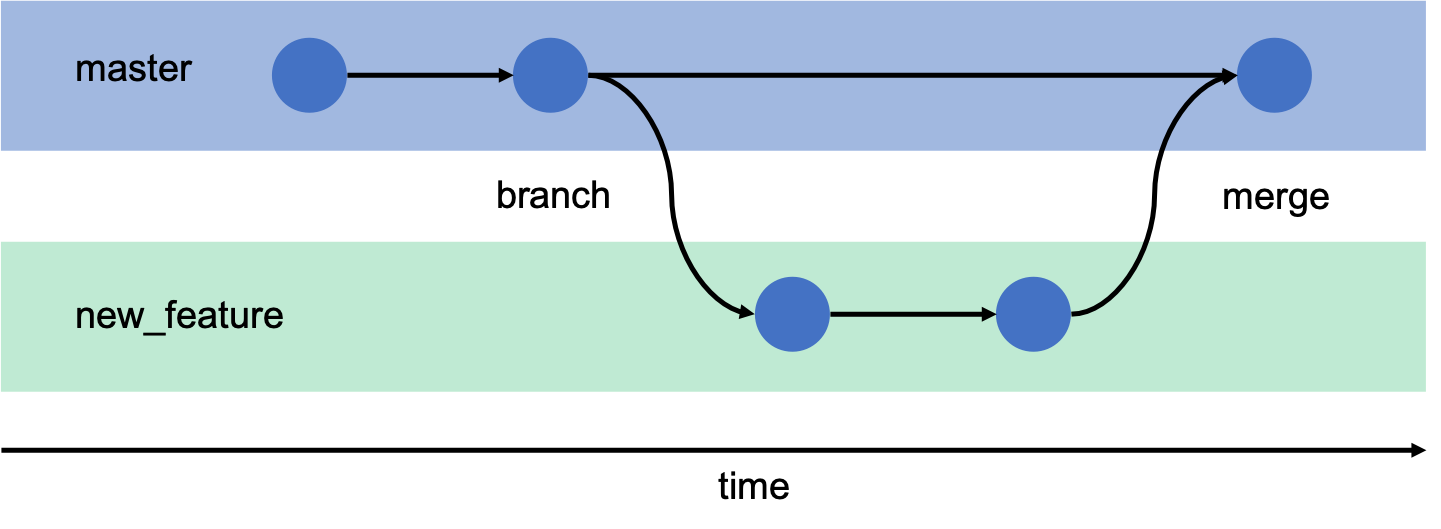
How does it work?
- At a specific moment in time, many devs might work on the same repository
- Each dev working on its own branch
- Branch might be local (available only on dev computer)
- Or Branch might be remote (available on the server too)
- Local branches are accessible only by single dev, a remote one, by the whole team
How to create a branch in git?
# create branch from current branch/commit
# and change to this new branch
git checkout -b BRANCH_NAME
# same as above, but slower
git branch BRANCH_NAME
git checkout BRANCH_NAME
# list local branches
git branch
# list all branches, including remote (that we know of)
git branch -a
# delete branch
git branch -d BRANCH_NAME
# merge/rebase branch to current branch
git merge SOURCE_BRANCH
git rebase SOURCE_BRANCHWhat are Pull Requests?
- Main GitHub Concept
- That made GitHub famous
- That set a new standard in the development process
- Simply put: it's a review process of the Merge/Rebase operation
What are Pull Requests?
- Its GitHub feature builded on top of branches
- Allows coordinators, to review changes before they will be merged or rejected
- It combines:
- code comments
- discussions
- issues linking
- automation
Prons of Pull Requests
- Peer review
- Testing and better stability
- Reducing conflicts during merge
- Clearer responsibilities
- Possible automation
Cons of Pull Requests
- The more changes/commits the harder to review (problem with tooling and cognitive load)
- Might increase the feedback loop
- It's easier to fix, then explain the fix
- Maturity of reviewer
Should I use Pull Requests?
- Yes!!!
- You have no other options in GitHub
- If you work with branches, you will have Pull Requests
- No!!!
- that depends on your project type and requirements...
- ... and platform
Pull Requests and CODEOWNERS
If CODEOWNERS file exists, Pull Request will automatically be assigned to people who are owners of specific files/paths defined in CODEOWNERS
How cool is that?
What is GitHub Flow?

demo: Pull Request
- Open repository
- Create a branch in GitHub
- Add file
- Create a Pull Request
- Show "automation"
- Convert to draft and back
- Assign a Pull Request to project
- Show project board
- Add comment to code
- Create issue from code line
- Merge Pull Request
excersie: Pull Request
- Create an issue in the repository
- Fork repository
- Add file/pretend to fix something
- Create Pull Request
- Reference issue in Pull Request
- Merge Pull Request
result: Pull Request
- The issue should be referenced by Pull Request
- It might be closed (depending on the wording, if Closes #issue_no was used) when PR is approved
- We can also reference issues with commit message - just add #issue_no
demo: Resolving Conflicts
- Open repository
- Create branch
- Edit readme.md file by changing text
- Move back to main, and do similar change but with different text
- Move back to the created branch, create Pull Request
- Resolve conflict in Pull Request
demo: pull request template
- Open repository
- Create folder .github
- Create file pull_request_template.md
- In file, you can add whatever content
- Create branch
- Do changes
- Create Pull Request
Many Pull Request Templates
- GitHub allows having more than one template
- Usage is not that straightforward
- In .github we need to create a PULL_REQUEST_TEMPLATE folder
- Each file inside it will be a template
- To use it we need to pass template query string param in URL
Pull Request Review Assignment Automation
- Feature only available in organizations on team level
- Can automatically using Lod balance or Round Robin assign reviewers to Pull Requests
- Only available in pay plan for organization

Summary
- We know what branches are
- We know what Pull Requests are
- We know what is the famous GitHub Flow
- We know how to create a branch and Pull Request
- We know how to resolve merge conflicts
- We know how to create Pull Request templates
- We know how to automatically assign Pull Requests to Reviewers
GitHub
Dependency
Managment
Agenda
- What problem do repositories have?
- What is a Dependabot?
- What are Dependabot alerts?
- What are Code scanning alerts?
- What is and how to use Dependency graph
- How to enable Dependabot for updating depedencies
Info
From now on we will be using an application from the repository:
What problem do repositories have?
To guarantee that code and all dependencies including references lib's, docker images, etc. are vulnerability free
What is a Dependabot?
- It's one of the answers to problem that repositories have
- It was a company that GitHub acquired
- Right now it's a part of GitHub ecosystem
- It's a tool that validates project dependencies
- It can automatically bump up the version of dependency with a Pull Request
What are Dependabot alerts?
- Alerts inform about the security problems in lib used directly or indirectly by our repository
- Alert informs what is the problem and how you can fix it
- With additional options turned on, Dependabot can bump up the version for that lib (not always possible)
demo: Depndabot alerts
- Open repository security section
- Turn on Alerts
- Open Settings/Security and shows that the same thing can be configured there
- Show option for auto-update vulnerable dependencies
- Open devWarsztaty to show an example of a security alert
What are Code Scanning alerts?
- Security alters about code
- GitHub uses Microsoft CodeQL to analyse code
- If CodeQL detects a problem, it creates an alert
- By default, it works with security problems, not code quality
- It can be configured to scan for code quality too
- GitHub allows choosing different tools for code analyses (some requires additional payment)
demo: Code Scanning
sercurity
- Open repository
- Go to Settings/Security or Security and click: Set up code scanning
- Show options
- Choose CodeQL Analysis
- Remove comments to show that is a simple file
- Show Actions section
- Show Code scanning alerts
demo: Code Scanning
quality
- Open repository
- In .github folder create file codeql/codeql-config.yml
name: "Security and Quality"
queries:
- uses: security-and-quality- Edit file .github/workflows/codeql-analysis.yml
- name: Initialize CodeQL
uses: github/codeql-action/init@v1
with:
languages: ${{ matrix.language }}
config-file: ./.github/codeql/codeql-config.yml # <-- add this line- Show Actions section
What is and how to use the Dependency graph?
- Dependency Graph is an insight into our repository
- It list dependency that our project depends on
- It list project that depends on our project
- It gives a good overview of dependency status in our project
demo: Dependency graph
- Open repository
- Open Settings and Security & analysis
- Show how to enable/disable dependency graph
- Show dependencies in Inisghts
- Show EvenFlow dependents
demo: Dependabot for dependencies
- Open repository
- Open Insights, Dependency graph then Dependabot
- If not enabled, enable it
- Click Create Config file
- In package-ecosystem provide nuget
- More options are available
- See Dependency graph then Dependabot
- See report
- Force re-run
- Show pull request
Summary
- We know how to automate security checks of depedencies
- We know how to receive alerts about security issues
- We know how to test code quality
- We know how to auto-update dependencies with Pull Requests
- We do not know what are Actions and Workflow yet!
GitHub
Actions
Agenda
- What are Actions?
- What can I do with Action?
- What Actions are available?
- What if Action I need does not exists?
Info
From now on we will be using an application from the repository:
What are Actions?
Actions is a piece of code executing a specific task. Actions are used in Workflow. Workflows define jobs and steps that we can automatically execute depending on the trigger (push, pull request created etc)
We define workflows in yaml format and we store it in our repo
We have control of what we want to execute and in what order
What can I do with Actions?
- Almost everything
- We can even just print out a version of the node
- Or we can build our application
- Or we can run tests
- Or we can deploy our application
- Or we can create custom CHANGELOG depending on the commits messages
- Almost our imagination is almost the only limitation
What Actions are avaliable?
- Easier to say: which one is not
- There are currently around 10k actions available
- All actions can be browsed through Marketplace
- From autogeneration of Changelog file, to... try to imagine something and then search for it
demo: Marketspace
- Open Marketplace
- Walk around it
demo: Automatic releases
- Open repository
- Add empty workflow
- Use example from Automatic Releases
demo: add dotnet build and test
- Open repository
- Click Actions
- Click New Workflow
- Click Set up this workflow for .NET
- Commit changes and take a look at Actions
- Create Pull Request and check what will happen
demo: add pacakge caching
- Open repository
- Click Actions
- Click New Workflow
- Use file dotnet-simple-cache.yml
demo: publish test results
- Open repository
- Click Actions
- Click New Workflow
- Use file dotnet-build-test-publish-artifact.yml
What to do if Action is not available?
- We can wait when someone will create one
- Or we can create one by ourselves
demo: Actions examples
- Open EventStore Automations repository
- Show code, do not explain it :)
Summary
- We know what are Actions and Workflows
- We know how to find Actions and sample Wofklows
- We know how to use Actions and Workflows
- We know what to do when Action is not avaliable
GitHub
Environments
and Packages
Agenda
- What are Packages?
- How we can use Packages?
- What are Environments?
- How to use Environments?
Info
From now on we will be using an application from the repository:
What are Packages?
- Packages are basically package repositories
- Place where we can store packages
- nuget,
- container,
- npm,
- maven,
- gradle,
- rubygems
- others that might be added in the future
How to publich Packages?
- Using CLI of the given tool
- Using Action automation
What are Environments?
- The environment is a grouping idea
- It groups jobs in workflows under a specific environment
- It lets also configure environment specific secrets
How to use Environments?
- We need to create them in Settings
- In job we need to reference it:
environment: env_name - The environment is a configuration property per job in workflow
demo: publishing nuget package
- Open repository
- Click Actions
- Click New Workflow
- Use file dotnet-build-package-publish.yml
demo: publishing docker image
- Open repository
- Click Actions
- Click New Workflow
- Use file docker-build-publish.yml
Summery
- We know what are Packages
- We know how to publish packages
- We know what are Environments
- We know how to reference Environment from actions
Summary
What we have learned
- What is Git and Github
- How to work with GitHub
- How to work around repositories
- how to create issues
- pull requests
- discussions
- static pages
- How to automate dependency managment
- How to automate our work with actions
- How to deploy application using actions
Is there more?
- YES!!!
- We've only touched the surface of the features
- We did not talk about:
- team management
- organization management
- features available to paying customers
Where can I learn more?
- GitHub documentation is not best but its the best resource right now
- Blogs and google
- You will struggle - but there are hidden gems
- Hope this documentation will improve with time
Thank You
Jakub Gutkowski
Enjoying Life
@gutek
https://blog.gutek.pl

